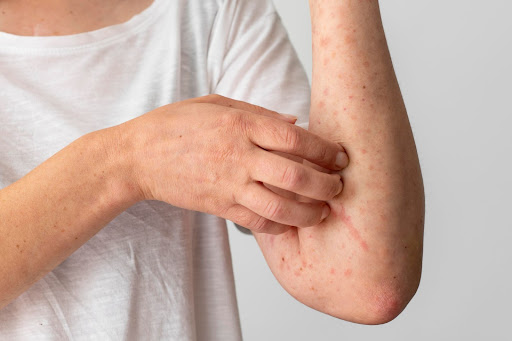
Eczema, also known as atopic dermatitis, is a chronic skin condition that affects millions of people worldwide. Characterized by itchy, inflamed skin, eczema can significantly impact a person’s quality of life.
While there is no cure for eczema, there are numerous effective therapies available to help manage and alleviate its symptoms.
In this article, we will explore some of the most successful approaches for conquering eczema symptoms and regaining control over your skin health, including the latest addition of IV therapy as a treatment option.
Understanding Eczema
Before delving into the various therapies, it’s crucial to understand what eczema is and what causes it. Eczema is a complex condition that can manifest in different ways, but common symptoms include redness, itching, dryness, and skin inflammation. It often appears as patches of rough, scaly skin that can crack and bleed.
The exact cause of eczema is still not fully understood, but it is believed to result from a combination of genetic and environmental factors. Individuals with a family history of eczema or other allergic conditions, such as asthma or hay fever, are more likely to develop eczema.
Effective Therapies for Eczema
Topical Steroids:
Topical steroids are one of the most commonly prescribed treatments for eczema. These medications come in various strengths and can help reduce inflammation and relieve itching. They work by suppressing the immune response in the affected area, which can help control eczema flare-ups.
It’s essential to use topical steroids as directed by your healthcare provider, as long-term or improper use can lead to side effects such as thinning of the skin. Your doctor will determine the appropriate strength and duration of treatment based on the severity of your eczema.
Moisturizers:
Keeping the skin well-hydrated is a fundamental part of eczema management. Regularly applying moisturizers can help lock in moisture, reduce dryness, and prevent skin from cracking. Look for fragrance-free, hypoallergenic moisturizers that are suitable for sensitive skin.
Emollients, which are a type of moisturizer, can be particularly effective in soothing dry and irritated skin. Applying moisturizer immediately after bathing while the skin is still damp can maximize its benefits.
Topical Calcineurin Inhibitors:
Topical calcineurin inhibitors, such as tacrolimus (Protopic) and pimecrolimus (Elidel), are non-steroidal medications that can be used to treat eczema, especially in sensitive areas like the face and neck. They work by suppressing the immune response locally, reducing inflammation, and relieving itching.
These medications are often prescribed when topical steroids are not suitable or when long-term steroid use needs to be avoided. However, they may cause a burning or stinging sensation upon application in some individuals.
IV Therapy:
Intravenous (IV) therapy, while less common, can be considered in severe cases of eczema that do not respond well to other treatments. IV therapy involves the administration of medications and nutrients directly into the bloodstream through a vein. It can be used to deliver powerful anti-inflammatory medications and hydration to help manage acute flare-ups and provide relief.
You can try out this approach under the guidance of a qualified healthcare provider for effective results and a potentially significant improvement in your eczema symptoms.
Antihistamines:
Antihistamines are commonly used to alleviate itching associated with eczema. While they do not treat the underlying cause of eczema, they can provide relief from the discomfort of itching.
It’s important to consult your healthcare provider before taking antihistamines, as some may cause drowsiness.
Wet Wrap Therapy:
Wet wrap therapy is a technique used to provide intensive hydration and reduce inflammation in severe cases of eczema.
It involves applying a moisturizer to the affected skin, followed by a layer of damp bandages and a dry outer layer. This method helps lock in moisture and can provide quick relief from itching and inflammation.
Wet wrap therapy should be performed under the guidance of a healthcare professional, as improper use can lead to complications.
Phototherapy:
Phototherapy, or light therapy, involves exposing the skin to controlled amounts of ultraviolet (UV) light under medical supervision.
UV light can help reduce inflammation and itching associated with eczema. This therapy is typically reserved for cases that do not respond well to other treatments or when eczema covers a large area of the body.
It’s crucial to follow your healthcare provider’s recommendations and attend regular phototherapy sessions as prescribed.
Biologic Medications:
For individuals with severe eczema that does not respond to other treatments, biologic medications may be considered.
These drugs work by targeting specific components of the immune system that contribute to eczema symptoms. Dupilumab (Dupixent) is one such biological medication that has shown promising results in clinical trials.
Biologic medications are typically administered as injections and are prescribed by dermatologists or allergists who specialize in treating eczema.
Lifestyle Modifications:
In addition to medical treatments, making certain lifestyle modifications can help manage eczema symptoms and prevent flare-ups. Some tips include:
- Avoiding known triggers, such as allergens or irritants
- Taking short, lukewarm baths and using mild, fragrance-free soaps
- Patting the skin dry after bathing instead of rubbing
- Wearing loose-fitting, breathable clothing made of natural fibers like cotton
- Using a humidifier to add moisture to indoor air, especially during dry seasons
- Practicing stress-reduction techniques, as stress can exacerbate eczema symptoms in some individuals
Conclusion
Eczema can be a challenging condition to live with, but effective therapies are available to help conquer its symptoms and improve the quality of life for those affected. Treatment plans are often tailored to each individual’s specific needs, and it may take some trial and error to find the right combination of therapies that works best for you.
Consulting with a healthcare provider, preferably a dermatologist or allergist with experience in treating eczema, is crucial for developing a personalized treatment plan.
With the right approach, many individuals with eczema can achieve significant symptom relief and regain control over their skin health, ultimately triumphing over this chronic condition.






